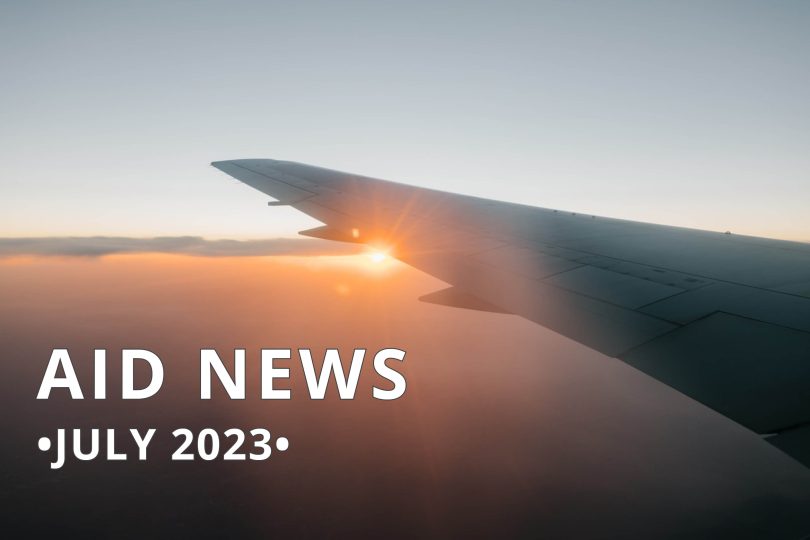Our monthly update of news and analysis on aid and international development, with a focus on Australian aid.
Australian aid
Australia has joined other countries in denouncing the unilateral decision by Russia to end the Black Sea Grain Initiative. The decision came as the UN reported that as many as 783 million people faced hunger in 2022 – an increase of 122 million people since 2019. The US also condemned Russia’s decision, and announced US$250 million in additional aid for Ukraine’s agriculture sector.
At their leaders’ meeting, Prime Minister Albanese and President Widodo announced that Australia would provide $50 million to support clean energy investments in Indonesian small and medium enterprises. In addition, Export Finance Australia will work with Indonesia’s state-owned electricity provider “to establish a US$200 million capital financing facility to support Indonesia’s energy transition”.
In a joint op-ed with his Canadian and New Zealand counterparts, Climate Change and Energy Minister Chris Bowen has called for a global financial architecture “that helps address the existential threat of climate change, while supporting countries’ development ambitions, responding to the millions slipping back into poverty and maintaining stability in the global financial system”. The op-ed calls on multilateral institutions to do more, but says nothing about what donors and shareholders need to or are prepared to do in support of that goal.
Australia reportedly joined with nations such as China, Russia and Brazil at the International Maritime Organization to block a proposed US$100 per tonne levy on global shipping emissions. The proposal – which would generate an estimated US$60-80 billion a year – was supported by several Pacific countries and other small island nations, as well as South Korea, Denmark and France.
Aid to Solomon Islands has again become a flashpoint in the bilateral relationship, with Prime Minister Sogavare accusing Australia and New Zealand of delaying budget support to justify his increased reliance on Chinese development and policing assistance following a recent visit to Beijing. DFAT has denied this is the case. Australia has promised $25 million to support next year’s Solomon Islands elections.
ACFID will host a virtual discussion with DFAT in August on the government’s forthcoming disability equity and rights strategy.
The government has appointed Professor Wendy Umberger as the next Chief Executive Officer of the Australian Centre for International Agricultural Research.
Regional/global aid
At a forum to promote its Global Development Initiative, China has announced a raft of new projects – including for infrastructure, energy, health and transport – in support of the UN 2030 Agenda.
The New York Times reports on Beijing’s reluctance to restructure or cancel large debts owed to it by developing countries that have previously taken on large loans under China’s Belt and Road Initiative and that now face fiscal crises.
The UAE has outlined its objectives and priorities for COP28 in its letter to parties. On climate finance, the letter calls on developed countries to make ambitious pledges to replenish the Green Climate Fund, ensure commitments to double adaptation finance by 2025 are on track, and to commit to “a new financial framework that can deliver the net zero transition in an inclusive way for all countries and communities…”.
At the G20 Finance Ministers and Central Bank Governors meeting in India, World Bank President Ajay Banga outlined some of the initial reforms aimed at increasing the Bank’s lending capacity. The Bank is also seeking to raise US$6 billion in concessional finance to fund its new Crisis Facility. A G20 commissioned report on multilateral development bank reform found that, in order to meet the globally agreed development and climate goals, “additional spending of some $US3 trillion per year is needed by 2030, of which $US1.8 trillion represents additional investments in climate action … and $US1.2 trillion in additional spending to attain other SDGs…”.
NGOs and aid groups have criticised the failure of the UN Security Council to extend the authorisation of a vital humanitarian corridor into northwest Syria.
The EU has signed a controversial new “migration and aid” deal with Tunisia. Under the agreement, the EU will reportedly provide a €1 billion package of aid and border security assistance in return for increased efforts by Tunisia to halt irregular migration across the Mediterranean by the thousands of African migrants now stranded in the country.
As part of ongoing Congressional budget negotiations, US House Republicans have proposed significant cuts to foreign aid, including big reductions in contributions to multilateral institutions, particularly the UN, and to programs that address climate change.
Aid groups in Germany, one of the world’s largest donors, have expressed their concern that the country’s governing coalition may be about to abandon an agreement that development spending should increase one-to-one with defence spending.
The Economist reports on how the UK has “blown its reputation as a world-leader in aid”, and how a future Labour government might restore it.
Reports, books, podcasts etc.
Australia’s former foreign minister Gareth Evans has lamented Australia’s woeful and worsening global ranking on aid generosity at a public forum at the University of South Australia.
Former senior OECD official Steve Cutts has launched a new website, ODA Reform, which aims to “draw attention to the self-serving changes that the Development Assistance Committee of the OECD has made in recent years to the way it scores Official Development Assistance, and to call for fundamental institutional reform”.
A new report from researchers at Oxford University considers the future role of international humanitarian and development NGOs based on the results of a three-year research project.
A new documentary from the UK provides first-hand accounts of the worsening humanitarian and human rights crisis that continues to unfold in Myanmar.
The ‘Ones and Tooze’ podcast discusses global development and climate finance and “trillion dollar sticker shock”.
Disclosure
Material for this update has been collected by Devpol staff; editorial responsibility lies with Cameron Hill. Devpol’s work on Australian aid is supported by the Bill & Melinda Gates Foundation. The views represent those of Centre staff only.



Leave a Comment